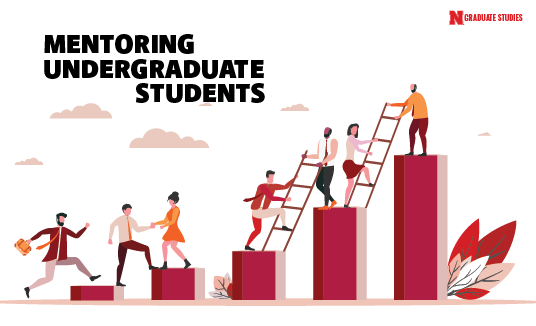
Mentoring undergraduate students is a privilege for graduate students. It is an opportunity to meet new colleagues and practice your skills as a teacher and mentor. However, as with anything worth doing, it can be pretty challenging. Here are some tips to make it the best experience for everyone involved.
Remember when you started? Before meeting this student, remember your first days in the lab. How did you feel? It can be overwhelming, and you might have been scared to break things. And all the experiments can be exciting. Your student may feel similarly at the beginning of the experience. Also, recall which simple things you learned first to identify where to start with your student.
Set goals and expectations. Talk to your students about why they are in the lab with you. You may have done internships; some may just be trying to fulfill a class requirement, while others were meaningful experiences for you to get into graduate school. Every student is different, bringing a different set of skills and experiences. Knowing your student’s goals will help you determine the best activities for them to develop the skills they want. It would be best to discuss lab expectations from this student, whether it’s time spent in the lab or tasks completed. And don’t forget about lab safety!
Create a conducive environment. The idea is to decrease the initial fear and maintain the excitement. Your student should not be afraid of you. Mistakes will inevitably happen, and you want your students to trust you enough to reach out to you about them before they can’t be corrected. A good strategy is to point out challenges early on and to remind them to take their time. Also, try to be very open about your mistakes in the lab and how the vast majority of them can be fixed.
Make them part of the team. Undergrads can be an important part of your lab. They contribute to projects and help keep the lab running. Share a lot about the experiments you are doing, the papers you read, or the results you get. Introduce your students to your lab mates and their projects. Undergrads may also get to participate in regular lab team meetings. The idea is to expose students to the science going on in your research group and the impact that you create as a scientist. Some days, you get to explain what you do; it helps remind you why you enjoy it. Hopefully, the undergrad will get excited, too.
Treat them like people. This is the most important point. Like you, undergraduates have a life beyond the lab. They will have good days and bad days. Part of mentoring is getting through all of those with them and building a solid relationship where both of you can grow as professionals. Be patient and kind.
If you do not work in a lab where you have opportunities to mentor undergraduates, you can also talk to your faculty and see if undergraduates are looking for mentors in the department. Undergraduate Creative Activities and Research Experience (UCARE) students, McNair Scholars, and First Year Research Experience (FRYE) students may all work in your department, and often, they are looking for graduate student mentors in addition to their faculty mentors.